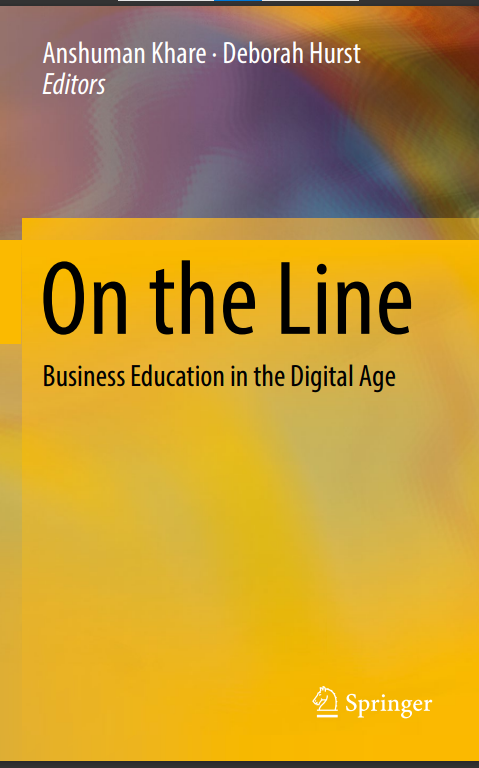
On the Lin Business Education in the Digital Age
Author: Anshuman Khare Category: Bisnis Publisher: Springer International Publishing AG 2018 ISBN: 978-3-319-62776-2 More DetailsBusiness organizations today are looking for work-ready graduates to whom they
invest in continuing education to support employees – a quick return on investment.
Concurrently, online delivery of courses and programs is on the rise benefitting both
individuals and their employers. Engaging in online education often mirrors the
way work is done in organizations while also containing costs. The debate about the
quality of online versus on-campus business education continues to rage. While
some resist the move to virtual campuses and learning, it is hard to deny the preferences of a connected population who seek increasingly flexible, accessible learning
opportunities, course materials, classrooms, faculty, and associated services anytime and from anywhere. This is causing disruption to how educators do business.
Business schools today are involved in the evolution of virtual courses and classrooms as an opportunity to reach remotely located and international students, as
well as students in immediate vicinities given demand for greater access and opportunity without adversely disrupting careers and lives.
The intent of this edited book is to present different perspectives of online business education – how it is best designed and delivered and how it supports advances
in management disciplines. Through the endeavor of linking theory to practice, the
authors describe online platforms in their provision of timely, excellent, and relevant business education.
This book intends to contribute insights for use to business educators in design
and implementation of online learning. We present and discuss technologies for
class facilitation and preparation, the “secret sauce” regarding meeting and exceeding collaboration expectations, adaptive content, tools used to bring content and
issues to life, disruptive approaches, and new emerging directions.
vi
Audience for This Book
This book is targeted at business educators and administrators who have an interest
in delivering high-quality business education using online platforms and tools.
Lessons learned, insights, and challenges have been discussed from various perspectives for those looking to gain insight into developing new educational programs that through collaborative online learning tools create aligned knowledge and
skill. This book is also intended for use of business practitioners interested in the
development of work-ready graduates and further learning opportunities that may
support their organizations.
Book Structure
The main theme of the book is online business education. The book draws from the
experience of academics involved with the development and implementation of
online business education, administrators, and researchers who investigate the technologies and closely watch marketplace trends. The book also presents perspective
papers from individuals who are involved with the development of online learning
approaches and systems as well as those who have taken online business programs.
The perspective papers capture graduates and consultants from different parts of the
world who provide interesting comments on their experiences of online business
education. It is our premise that educators, graduates, and consultants alike have
much to share and learn from one another to encourage further development of
online business education.
The book is divided into three parts.
Part 1 presents papers on “why” business education is viable and sustainable in
today’s context. The book starts by examining the emergence of online business
education. Treating education as a service, this part describes new techniques for
creating a better online business education experience. It also looks at the role
advanced data analytics can play in enhancing the quality of online business
education.
Part 2 delves into “how” online business education works. It presents conceptual
models for teaching in specific disciplines and learning design that describes what
business educators do and how programs work. This part also addresses performance assessments and quality assurance measures that help to demonstrate the
efficacy of online pedagogy. Practical applied papers are used in this part to highlight the use of learning platforms, tools, and their application specific to businesses
that build knowledge and skills and make students “work ready.”
Part 3 of the book addresses the “so what?” or the outcomes and impacts of
online business education. This part targets where business education needs to take
learning next, for example, to support sustainable business, ethical decision making,
and inclusive and collaborative leadership. Papers deal with topics such as how
Preface
vii
distributed online environments may work better to support knowledge and soft
skill building directly relevant for organizations today. Other learning outcomes
showing the value of online business education are discussed.
Integrated into each part are short papers that present student, consultant, or
online educational user “perspectives.” These short chapters both support the content within some of the chapters and question approaches with the customer perspective. They are intended to create an ongoing conversation with interesting
themes emerging to connect real-world practices and approaches.
It is our view that engaging in online business education is like a marathon where
an educator must plan, pace, and manage the learning. While online business education intends to help individuals achieve personal goals, they recognize too that some
may miss out on important in-person learning gained through the physical presence
of other classmates. Thus, at times the need for specialized blended degrees in topics such as leadership, change management, supply chain management, project
management where students benefit from face time with other students, or the
broader business perspectives may be beneficial. It is important to provide opportunities for students to leverage both place-based and online business education for
knowledge and skill building within a broader educational ecosystem.